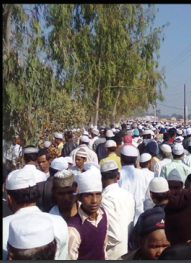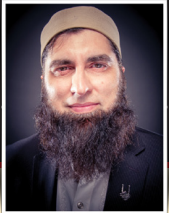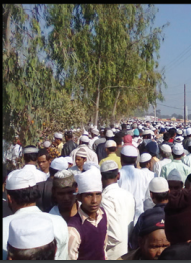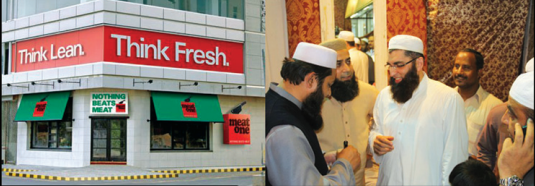Junaid Jamshed could be regarded as an enigma. Once a musical superstar, he has now become an Islamic preacher. In fact he is more than a preacher; he is a businessman, a philanthropist, a broadcaster, and occasionally he sings too!
Junaid Jamshed could be regarded as the Muslim Everyman, but he just wants to be simply known as a submitter to Allah. We follow him during a busy working day in London and find a man dedicated and determined.
Movements often begin with one or a few idealistic individuals in austere surroundings. Their zest inspires and soon spreads to influence millions. A cavernous living room in a bustling north London town is far removed from the rustic surroundings of an Indian village in early 20th century, yet it was within the latter that Muhammad Ilyas Kandalwi exhorted the Muslims to “Be Muslims!” And generations since have heeded his call. Their submission was not to the world but to Allah; their purpose was not for the world but for Allah; their souls were not with the world but with Allah.
Kandalwi’s propagation of an apolitical, quietist approach to Islam focused on the reformation of the individual by the individual is hardly original. Sufis were renowned for disengaging with society and spending long periods of time in prayer and meditation. Kandalwi was a sufi but he wanted to engage and reform society. He sent his students to set up schools and mosques in different villages with instructions to interact with the Muslims who had lost their way, to tell them about the proper way of practising Islam and to remember Allah at all times.
The movement burgeoned, spread throughout the Asian sub-continent. Millions heeded his call, dedicated their lives to Allah, and as migration to the western world grew, migrants brought the message of Kandalwi with them. In Warsaw, Paris, Chicago, and Melbourne, the message resonates. Be Muslims! And the numbers swell. The movement has grown throughout the world; most of the global Muslim population are aware of their existence and influence and members reside in all major cities of the world. Like London and the cavernous room. Several bearded individuals wearing shalwar kameez sit on the floor, saying Bismillah before they start eating. Another man walks in: tall, short hair, long beard and wearing glasses. The men greet him with Assalamualaykum, and a palpable sense of awe enters the room. The man is a celebrity. He was part of the music fraternity. He is now part of the movement to which he has dedicated his life. The movement is Tablighi Jamaat; the man is Junaid Jamshed.
A stairway to heaven
“I wanted to be a pilot like my father but due to my poor eyesight I was unable to”, remembered Junaid, now sitting in a small office following a charity fundraiser with Channel S, the Bengali cable channel. It was 11pm and as Londoners retired to their bedrooms, Junaid Jamshed
was still energetic. His day had been busy. From the north London living room, Junaid and his entourage travelled to a mosque in east London. They prayed zuhr with local congregants, then a sermon delivered by Junaid on his experiences and the magnificence of Allah. “I have always been an introspective and focused man. I set an objective for myself and keep walking towards it. There is nothing special in me apart from what Allah has blessed me with, and this is my focus and dedication. The day I realised that the music industry is opposite to a path to Allah, I decided to leave irrespective of the costs and the loss of fame.”
The day Junaid Jamshed left the Pakistani music industry, the country had lost one of its most popular artists. From 1987 to 2001, first with the band Vital Signs and then as a solo artist, Junaid had released a string of hits to critical acclaim. “Dil Dil Pakistan”, Vital Signs panegyric to Pakistan, was ranked the third most famous song according to an international poll conducted by the BBC in 2003. Released in 1987, its ongoing popularity is in part due to its patriotism, in part Junaid’s mellifluous voice. “I was a good Quran reciter in school. I could stress the Arabic words correctly. All this reading was virtually the best training I could get to prepare my voice for singing. So when we formed the band, it was easier for me to sing for hours on end.”
Yet Junaid turned his back on the industry. “I believe mankind is influenced by their environment. I was not mentally ready to join a gathering of virtuous people especially since there was no one to take me to such a gathering, to teach me, to help me but once you find the right person who wants to help you, who wants to guide you to the path of Islam then things get easier”. It was through the insistence of a friend to attend a religious gathering that his journey into Tabligh began in 1997. In the
same year, he met Maulana Tariq Jameel, a popular Tablighi Jamaat scholar from Pakistan. Through regular discussions and attendance to Tablighi gatherings, Junaid slowly changed. “I will say the change was difficult at first. I had so much money and fame. When you are used to a certain lifestyle, it takes a lot of effort to change your ways and tackle new goals.” It may have taken time but the reformation was emphatic.


“Allah has created me as a Muslim; now I have two objectives in my life: Firstly, to do as Allah wants me to in my prayers, interactions and businesses; and secondly to spread the message of Islam all over the world”
Same year, he met Maulana Tariq Jameel, a popular Tablighi Jamaat scholar from Pakistan. Through regular discussions and attendance to Tablighi gatherings, Junaid slowly changed. “I will say the change was difficult at first. I had so much money and fame. When you are used to a certain lifestyle, it takes a lot of effort to change your ways and tackle new goals.” It may have taken time but the reformation was emphatic.
A man with many roles
Time for Junaid Jamshed is a valuable commodity and each moment he spends in remembrance of Allah. A conversation, eating a morsel of food or discussing the health of his projects, Allah reverberates in his mind. Worshipping Allah drives him, not only in terms of prayer but also in his work. Junaid is a busy man, handling several different projects including clothing lines, butchers, producing nasheeds, charities, broadcasting and, of course, teaching Muslims about Islam. “ I am a business man. I have a clothing chain in Pakistan called Junaid Jamshed (J.). The vision of my company is to give the message of Allah by conducting trade as Allah and his messenger has asked us to do. Abdur Rahman bin Awf, one of the ten companions guaranteed heaven, was a very good trader and was known for his trade. The Prophet called him Tajir Al-Rahman (Allah’s trader). The world should know how a true Muslim trades, following the law that Allah has provided, and avoiding that which Allah finds disagreeable. This is the vision of my company”.



“ I started J. in 2002. We have a creative department that designs clothes for men, women and children. The designs are then sent to our factory to produce the clothes. We use imported thread that is fine and strong, which ensures that there is no puckering or tearing at the stitch. Today, by the grace of Allah we are the biggest clothing outlet in Pakistan with 34 stores in 15 cities.” This is not the only business Junaid has set up. “I have started a butchers in Pakistan committed to providing top quality, hygienic meat to our customers. In the West, organic meat or free-range eggs symbolise the quality of the product. There is a value added to the product. However, in Pakistan, assessing the quality of the meat is difficult. Hence, we have started value-added meat shops in Pakistan called “Meat One”. In Pakistan the concept of meat is still attached with the butcher; if someone wants to buy meat he/she will go to the butcher who may have little concern for hygiene. At Meat One, the customer will find meat which is guaranteed fresh, of high quality and preserved hygienically. We currently have 9 outlets in all the main areas of Karachi but we are planning to expand throughout Pakistan.”
Tablighi Jamaat concentrates on preaching to Muslims, attempting to strengthen the person’s own beliefs and improve their practice. Members often go to another town to preach to the community for a few days, weeks, months of even years. However, its quietist approach has been criticised for not doing enough to tackle community issues, and its pedantry on worship avoids addressing social problems. Junaid, on the other hand, synthesises worship with activism. He is strict in
his observation of Islamic practices but is committed to engendering an Islamic philosophy to the various activities he undertakes. His belief is strong and provides the foundation of his ethics and acts: “Whosoever performs a job with honesty, Allah will help him no matter what, and whosoever cheats or goes against the teachings of Allah, they will be punished regardless of the amount of money he has”. As a paradigm, it imbues itself in the diverse range of activities that he is involved in. “Once someone said to me that Tablighi guys preach but do they do charity as well? This question assailed me until Shaikh Muhammad Imdad Hussain Pirzada got in touch. He had started ‘Muslim Charity’ and wanted me to help build the charity. I was grateful for the opportunity and joined in 2003. It is a UK-based charitable organisation and we have many projects around the world. We have built 5 maternity hospitals in Pakistan. Initially, the organisation was only working in Bangladesh and Pakistan but has now grown into India and we are planning to go to Sri Lanka as well as Somalia, Kenya, and South Africa.”
They share a passion for their religion and for helping the community. It is for Muslim Charity that Junaid is fundraising at Channel S. He delivers a nasheed, acapella songs in praise of Allah and/or the Prophet, and talks about the charity. The day had been consumed by issues relating to charity although this is what Junaid enjoys. He wants to give back to society be it in commercial, charitable or media endeavours.
Understanding Islamic finance
Junaid Jamshed is interested in Islamic finance. Alif Investments is a Dubai-based, Shari’a-compliant investment company and is an investor in ‘J.’ and Meat One. The company was formed in 2009 with the objective of investing, according to the Shari’a, in organisations that provide food, clothing and shelter. Junaid wants to support the growth of Islamic finance and clear misconceptions. He, himself, misunderstood Islamic finance until the sagacity of a world-renowned scholar clarified his views. “I asked different people about Islamic finance and inevitably their answer was that there is no such thing as Islamic finance. The outcome of a transaction is the same as a conventional financial transaction, just the way they do it is different. I asked Mufti Taqi Usmani and his eloquent response changed my perspective. The Quran says, ‘Those who devour interest will rise up on the Day of Judgment like the man whom Satan has driven to madness by his touch. This is because they claim that trading is like interest and how strange it is that Allah has permitted trading and forbidden interest.’ People do not recognise the difference”. Consequently, Junaid hosted a programme on Islamic banking bringing in Islamic financial practitioners, CEOs from conventional banks and Shari’a advisors to discuss, debate and explain technical issues. “I hosted the programme to learn about Islamic finance and also to educate others. I think the main difference between Islamic banking and conventional banking is that the institution becomes your partner, sharing the profits and the loss. In conventional banking, they do not care where you are investing; they just care about the return of principle and interest. Islamic banks invest with you in the project and their screening criteria is quite stringent. I agree with this method of banking and this is why I used Islamic financial institutions to help me with my businesses”.
While Junaid is effusive in his praise of the Islamic banking model, he recognises the problems with the industry but does not ascribe blame onto the model. “The Islamic banking model is good. The problem is with the people who are implementing the model. The person who goes to hajj could be a bad person but that does not mean the hajj is wrong; a worshipper who prays could be evil but that does not mean the prayer should be ignored. Bankers could be wrong, but that does not mean Islamic banking is wrong. A faith-driven person would never go against this model and so it appears to me that there is a weakness in the faith of bankers. I tell my banker friends that they should go on tabligh (preaching about Islam) for four months in order to strengthen their faith. After returning, they can apply the Islamic banking model with a belief that this model is pleasing to Allah. There is no concept of banks in Islam but interest is prohibited regardless. If bankers deal with interest, they go against the commands of Allah and his Prophet”.
Such definitiveness confers absolute power to Allah. Junaid lives his life with the belief that ignoring the commands of Allah can only lead to tragedy, be it in this life or the hereafter. He ascribes his success to Allah and sees his wealth as a determinant on His pleasure. He holds similar views about Pakistan, a country suffering due to corruption and a faltering economy. “Economic improvement has nothing to do with the policies of the country or the changes in currency rates; it has to do with honesty. This is something I want to be imbued in my own company. I do not have advisors, or read financial newspapers, I rely on Allah. Allah has stated in the Quran that He is the one that increases or decreases sustenance, and all we need to do is follow his law in action and spirit. If the businessman is not honest, we cannot blame governmental policies. His corruption will ensure Allah’s blessing is not upon them, which will then affect his own business, and if everyone is the same, then it will affect the whole economy. Pakistan’s economic problems are a punishment for our acts; however, I have seen good, honest businessmen enjoying a booming business because they follow the divine commands.”
Actions speak louder than words
The indefatigable Junaid Jamshed left for the cavernous living room in north London late at night. It is unlikely he slept much that night, waking up at dawn to worship his Lord. Members of Tablighi Jamaat inculcate the immediacy and the availability of Allah in their lives but very few take the lessons of spiritual improvement and apply it successfully to their practical lives. Junaid Jamshed is one of the exceptions. “Our current life is merely a preparation for the test that awaits us after our death. And we should thoroughly prepare ourselves. All I can do is travel around the world and call people to follow the path that I have chosen. That’s all I can do”.



